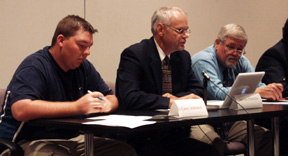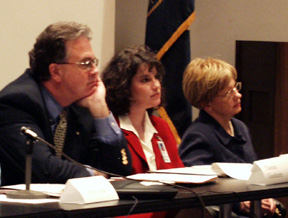In the aftermath of last year’s terrorist attacks, universities across the country are weighing security issues with individual freedoms. UNMC is no exception.
 |
Casey Johnson, left, Steven Hinrichs, M.D., and Timothy Butz participate in the Sept. 18 forum on background checks. |
For years, UNMC has does background checks for particular job classifications, such as security and child care, or when a department requests one, said Rod Kelly of Human Resources. Now, campus leaders are evaluating the list of jobs that require background checks, as well as discussing the type of background checks that need to be done.
Criminal background checks are legally permissible as long as the criteria applied is consistent and fair, said Amy Longo, J.D., attorney and adjunct assistant professor in UNMC’s preventive and societal medicine.
In developing any policy on background checks, Longo posed several questions including:
- Would a criminal background check include only felonies, or would it extend to misdemeanors?
- Would the state the person is seeking employment in be checked, or every state the person has resided in?
- How far back would the check go?
- How would the information be used?
Ethicist Toby Schonfeld, Ph.D., assistant professor in UNMC’s preventive and societal medicine, recommended altering the environment without alternating a persons’ fundamental rights to privacy. Campuses risk creating a class of “permanently inaccessible individuals,” she said, unless policies instituted are nondescriminative.
Thomas Gouttierre, dean of International Studies and Programs at UNMC and UNO, supports the need for a more effective tracking system for international students to ensure they are complying with their education visas. “I know it’s relatively easy for people to come to the United States to study and then jump ship and just get lost,” he said.
 |
Thomas Gouttierre, left, Toby Schonfeld, Ph.D., and Amy Longo listen to question from the audience. |
Three of the 19 hijackers from Sept. 11, 2001, were in the United States on student visas. One never enrolled where he was supposed to study.
Conducting background checks on international students is extremely difficult, Gouttierre said, citing inadequate national and international systems. Even so, it is important to host international students, he said. “The United States profits greatly from having international people come here to study,” Gouttierre said. “They also help make major contributions to medical science.”
Last year UNO had 1,122 international participants on campus — the largest in its history, he said. UNMC, too, set a record with 307 students. Together, the students contributed $20 million to the Omaha economy.
In October 2001, Congress passed the Patriot Act, which requires research institutions to prohibit access to hazardous materials, which could be used for bioterrorism, to certain groups. According to Steven Hinrichs, M.D., professor, UNMC pathology/microbiology, those groups include illegal aliens, those who reside in nations the government has determined support terrorism, fugitives from justice and those once committed to mental institutions.
“We’ve been willing to throw away individuals rights and liberties in the name of security,” said Timothy Butz, executive director, ACLU Nebraska. “Background checks are really not a guarantee of anything. The world of religious fundamentalists is not restricted to skin color.”
Society, Butz said, is no longer determining conduct based on “probably cause,” but “suspicion.”
Casey Johnston, vice president of the UNMC Student Senate, questioned whether a student who had an outstanding MCAT score and grade-point-average would be disqualified from entering the health profession if a background check revealed an undergraduate arrest for minor-in-possession. Would that make them a less capable, or less effective physician, he asked.
In the end, Longo suggested taking the issue of background checks out of the context of bioterrorism and developing criteria, which outline the type of individual the university wants practicing in the profession.